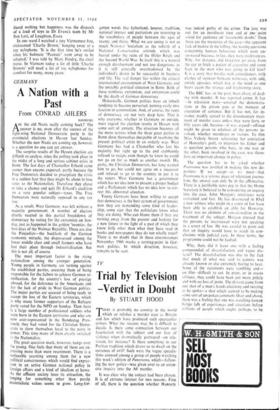A Nation with a Past
GERMANY
From CONRAD AHLERS
HAMBURG
A RE the old Nazis really coming back? The
IA answer is no, even after the success of the right-wing National Democratic party in the provincial elections in Hessen last Sunday. Whether the new Nazis are coming up, however, is a question no one can yet answer.
The surprise results of the Hessen election are difficult to analyse, since the polling took place in the midst of a long and serious cabinet crisis in Bonn. The last days of Chancellor Erhard came sooner than anyone expected, partly because the Free Democrats decided to precipitate the crisis in a sudden fear that they might be about to lose votes to the Nationalists. Therefore they chose to take a chance and quit Dr Erhard's coalition on a very popular subject—taxes. The Free Democrats were naturally opposed to any tax rise.
As a result, West Germany was left without a majority government. A number of electors clearly reacted to this partial breakdown of democracy by voting for the extremists on Sun- day, just as happened in the golden 'twenties, the best days of the Weimar Republic. There are also the Poujadists—the backlash of the German economic miracle, the dispossessed among the lower middle class and small farmers who have lost their place through industrialisation. But this is not all, of course.
The most important factor is the rising nationalism among the younger generation. Young people in Germany are turning against the established parties, accusing them of being responsible for the failure to achieve German re- unification, for the country's loss of prestige abroad, for the deference to the Americans and for the lack of pride in West German politics. The major parties are accused of being ready to accept the loss of the Eastern territories, which is why many former supporters of the Refugee party voted for the NPD on Sunday. Then there is a large number of professional soldiers who were born in the Eastern territories and who are now over-represented in the Bundestag. Prev- iously they had voted for the Christian Demo- crats to show themselves loyal to the party in power. This time many of them clearly switched to the Nationalists.
The great question mark, however, hangs over the young. One feels that many of them are ex- pressing more than mere resentment. There is a noticeable yearning among them for a new political consciousness which would find expres- sion in an active German national policy in foreign affairs and a kind of idealism at home. As the affluent society loses its attraction, the longing for something other than purely materialistic values seems to grow. Long-for-
gotten words like fatherland, honour, tradition, national interest and patriotism are returning to the vocabulary of people between the ages of twenty and thirty. What we are seeing is not so much National Socialism as the rebirth of a National Conservative attitude which was buried under the ruins of the Hitler Reich and the Second World War. In itself this is a natural enough development and not too dangerous, as it is still generally overshadowed by the individual's desire to be successful in business and life. The real danger lies within the critical international ens ironment of West Germany and the unstable political situation in Bonn. Both of these reinforce extremism, and extremism could be the death of German democracy.
Historically. German politics have an inbuilt tendency to become perverted, turning easily into fascism or communism. And, of course, the roots of democracy are not very deep here. That is why everyone, whether in Germany or outside, must regard the election results in Hessen with some sort of anxiety. The situation becomes all the more serious when the three great parties in Bonn show themselves incapable of resolving the present political crisis in an orderly way. West Germany has had a Chancellor who lost his majority but right up to the end stubbornly refused to resign, even though he knew he could not go on for as much as another month. His party, the Christian Democrats, has long wanted him to go, but could not agree on a successor and refused to go to the country to put it to the voters. West Germany has a government which has no idea how to present a proper budget and a Parliament which has no idea how to cor- rect this abnormal situation.
Young Germans have been willing to accept that democracy is the best system of government; now they are demanding some kind of leader- ship, some sign that the politicians know what they are doing. Who can blame them if they are turning away from the present and looking for a new future in the light of a past of which they know little other than what they have read in books and newspapers they do not wholly trust? There is no doubt that in these circumstances November 1966 marks a turning-point in Ger- man politics. In which direction, however, remains to be seen.






































 Previous page
Previous page